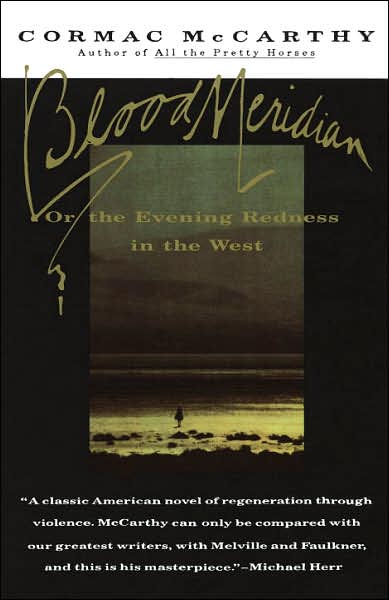
Blood Meridian is a blood-soaked, bloodthirsty bastard of a book, and certainly the most violent piece of literature I’ve read outside of the Bible and certain Greek tragedies. Cormac McCarthy’s 1985 novel passes itself off as a Western–and it is a Western, to be sure–but more than anything, it’s a brutal horror story.
Set predominantly in the 1850s, Blood Meridian chronicles the westward journey of a protagonist we know only as “the kid.” After a few false starts (including getting shot, robbed, arrested, and surviving a Comanche massacre) the kid eventually meets up with John Joel Glanton‘s “expedition”–a group of men of mixed backgrounds hired by Mexican authorities to kill–and scalp–the nomadic Apache that prey upon Mexican villages. However, led by the nefarious, larger-than-life Judge Holden, Glanton’s gang quickly descends into a relentless robbing, raping, and killing spree; they savagely massacre peaceful Indian settlements along with the Mexican villages they were contracted to protect.
I could keep summarizing the book, but I don’t see the point, honestly–a mere description of the plot could never do real justice to the weight of this book. The narrative is taut and fast-paced–in fact, at points the action is so radically condensed that I had to go back and re-read sections–and there’s no shortage of the “men doing men stuff” that McCarthy is so good at detailing–but it’s really the combination of the book’s evocative imagery and philosophical pondering that hook the reader.

Most of that philosophical pondering comes from the Judge, who waxes heavy on everything from space aliens to metallurgy. In his parables and aphorisms, the Judge comes across as part-Mephistophelean, part-Nietzschean, all dark wisdom and irreverent chaos. I found myself re-reading the Judge’s speeches several times and chewing them over, trying to digest them; for me, they were the best part of a great book.
Blood Meridian, like most excellent things, is simply not for everyone, and I don’t mean that in any snobbish, elitist sense. Any reader turned off by its freewheeling violence would be justified, and I’m sure plenty of folks out there would take issue with its ambiguous conclusion. Depictions of genocidal mania that seem to end inconclusively are not for everyone, particularly when they are rife with archaisms, untranslated Spanish, and McCarthy’s signature, apostrophe-free punctuation. I had two false starts with the novel, including one where, at about exactly half way through, I realized I had to go back and start the novel again. I owed it that much. And it was worth it.
Blood Meridian is literally stunning; perhaps the best analogy I can think of is going to see a really, really good band that plays really, really brutal and strange music that sorta melts your face off. After the show you’re sweaty and exhilarated and even unnerved; your ears are ringing and your chest is pounding. And then the band packs up, and the house lights go on, and they pump in music from a CD, of all things, and the music just sounds tinny and pale and blanched of life after the raw power you’ve witnessed. Reading anything else right after finishing Cormac McCarthy’s Blood Meridian, or the Evening Redness in the West is sort of like that. Highly recommended.

This is the first McCarthy book I read, suggested to me by none other than William Gibson.
I met him at a SF convention in Vancouver where we were both guests and asked him what he was reading (writers love this question). His eyes lit up and he rhapsodized about BLOOD MERIDIAN–I went out later that day and found a copy and haven’t looked back.
Good post…
LikeLike
I went through this book slowly. Because I had so many other things to do, it took months to get to the end. I was numbed by the violence. The real genius of the book, for me, was in the last 20 pages. A quiet, beautiful conclusion.
Good post.
There’s an even earlier novel of his about a kid who is orphaned and has to raise himself in the forest (or something like that). I’ve heard rave reviews about it even if I can’t remember the title.
LikeLike
ah now i’m much more stoked about reading this. I actually looked for “The Road” in the library yesterday but they were all checked out. i’ve been looking for an entry point to McCarthy so i might just make this it. good stuff.
LikeLike
I thought All the Pretty Horses was great, too. Some people think that it might be overly sentimental, but I thought it was beautiful. You might want to try that as well
LikeLike
All the Pretty Horses was the first McCarthy book I was exposed to. I was a senior in high school and one of my friends was reading it (surreptitiously under his desk in our crazy-ass stat class, no less). I asked him what it was; he told me it was “supposed to be really good,” but it looked, as the kids like to say, totally gay to me. “All the Pretty Horses”–not tough (I was heavily into Hemingway, Salinger, Wm Burroughs, Vonnegut, Bukowski, Henry Miller, Kafka, etc. at the time). It seemed like a kind of cowboy romance, like Lonesome Dove or something. I completely dismissed it, and for years believed McCarthy was, like a sappy romance Western novelist (the movie w/ Matt Damon certainly didn’t help this prejudice). When The Road started getting so much press for being apocalyptic, etc., I was really shocked, but figured I essentially had to read it. I’m actually rereading it right now, after finishing Blood Meridian, until I can get a hold of something else. I actually found a copy of Horses though, that I ganked from my school. Should I read it? Or earlier McCarthy?
LikeLike
The Border Trilogy (All the Pretty Horses, The Crossing, Cities of the Plain) is pretty good. It’s a really unusual transition for the writer of Blood Meridian, but that’s sort of the point, the saving grace of the three later novels. If B.M. is a story of total negation, the border trilogy is probably the author’s attempt at overcoming that negation. In some ways they aren’t that great (especially if Blood Meridian is your first standard of this author’s writing) but they contain some really good considerations of history as well as some pretty hard-hitting ironies about borders (national, internal, symbolic, etc.) Some criticize their anachronistic qualities, but still definitely worth reading. I’d like to know of other authors who deal with the same range and depth of ideas as McCarthy, but sadly I haven’t found any yet.
LikeLike
There is now an excellent philosophical analysis of Blood Meridian and the border trilogy available online. I always found the philosophical view in McCarthy’s books especially difficult to coherently organize without the crutch of some kind of politics (most of the literary criticism of these works falls far short as far as comprehensiveness goes). So needless to say, this really got me excited:
http://www.scribd.com/doc/2928341/HEGEL-MODERNITY-AND-TELOS-IN-CORMAC-MCCARTHY
Really great stuff for anyone interested.
LikeLike
[…] posted a great interview with master critic Harold Bloom this week. Bloom speaks at some length on one of our favorite books, Cormac McCarthy’s violent opus Blood Meridian, which was AV Club’s “Wrapped Up In Books” book club selection for June (pretty […]
LikeLike
This is the first McCarthy book what I read. The Blood Meridian fascinated me!!! I read it in Hungarian and I wanna read it in English. Where do I find this Book on internet??? If Somebody knows it, writes me PLS! …plsPLsPLS…!!!
My e-mail: honcsi93@citromail.hu
LikeLike
I love your review. Great post. I completely relate to your restarting Blood Meridian when you were half way through. I have restarted every McCarthy book I’ve ever read at about the fifty page mark. It’s just something I find I have to do. And McCarthy is the only writer I do it for.
LikeLike
Ardin, next week will be “Blood Meridian Week” at Biblioklept in honor of the book’s 25th anniversary. I’m actually re-reading it right now.
LikeLike
I read an excerpt in my senior English class of The Crossing about 4 years ago and was immediately hooked. I decided then and there the The Crossing would be my choice for our final paper/project. Since then I have done my best to get my hands on all of McCarthy’s books. I’ve just finished Blood Meridian, definitely one of his best works in my opinion, and now I can’t wait to crack open another masterpiece by McCarthy. It’s so refreshing to find actual writers in this day and age where books are no more based on poetic, metaphoric language and stories to leave a reader pondering the philosophy in its pages. Where can I find more writers like Cormac McCarthy???
LikeLike
Hi, Mary,
Have you read Suttree yet? It’s really fantastic, I think—maybe my favorite (outside of Blood Meridian). I reviewed it here:
https://biblioklept.org/2010/11/27/suttree-cormac-mccarthy/
As far as writers like McCarthy—I think he’s following Faulkner and Melville, and you can’t go wrong with either, in my humble.
There’s also a really cool dystopian book called A Canticle for Leibowitz that is Blood Meridianesque.
And George R. R. Martin’s A Song of Ice and Fire books are as violent as Blood Meridian.
Cheers,
Ed Biblioklept.
LikeLike
i love mccarthy for his spiritual feel. i feel a part of everything and nothing at the same time. as for jesse dont post dissertations please
LikeLike
Just finished the Audible edition of Blood Meridian. Had listened to The Road previously and savored the print editions of the Border Trilogy. Now, after listening to Blood Meridian, I must do just what our reviewer did when “I found myself re-reading the Judge’s speeches several times and chewing them over, trying to digest them; for me, they were the best part of a great book.”
You can only ponder theses passages briefly when you are listening to as powerful piece as McCarthy has gifted us with; they entreat for thoughtful reflection.
I’m on my way to Alibris to order up my copy.
LikeLike